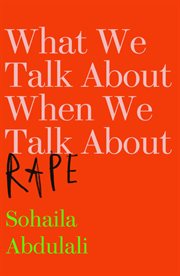Review by Booklist Review
In 2013, Abdulali wrote an op-ed for the New York Times about her own experience of rape and its aftermath. This book expands that essay, examining rape and rape culture on a global level and in the wake of the #MeToo movement. In the three decades since her rape, Abdulali has worked at a rape crisis center, interviewed survivors from around the world, and written extensively on the topic. But her book is by no means meant to be the final word on rape; she intends, in fact, to start a dialogue. In the introduction, she admits that she may contradict herself but that hers is no simple topic, and individual experiences of and responses to rape vary dramatically. She writes in a conversational style and injects a levity that, rather than betraying the seriousness of her subject, makes it more possible to handle the necessary yet horrifying details of rape of all kinds. An important book working towards an important goal: meaningful and thoughtful discussion of a taboo subject.--Kathy Sexton Copyright 2018 Booklist
From Booklist, Copyright (c) American Library Association. Used with permission.
Review by Publisher's Weekly Review
Abdulali (The Year of the Tiger) brings precision, clarity, and style to her exploration of a topic often treated as more confusing than it is. A former coordinator of a rape crisis center, she uses her own brutal rape as a touchstone and springboard for this series of extended reflections on the discourse surrounding rape, with stories from Australia, Egypt, India, Italy, South Africa, and the U.S. Drawing on interviews, personal emails, government reports, and other documents, Abdulali discusses varied scenarios, from date rate, marital rape, and incest to gang rape and war crimes, acknowledging the high rates of rape perpetrated against trans people and sex workers. She approaches debates about consent, responsibility, motive, honor, and prevention with deep compassion, humor, a healthy dose of irony, and anger. Though Abdulali doesn't claim to have answers, the book's assertions are clear: victims deserve belief, support, and a fair hearing; rapists, not their targets, are responsible for rape; and survivors can go on to live full and joyful lives. Her clear-eyed assessments, grace, and literary touches will make this book valuable reading for sociologists, therapists, feminists, and anyone who believes women should be able to move through the world free from fear. (Nov.) © Copyright PWxyz, LLC. All rights reserved.
(c) Copyright PWxyz, LLC. All rights reserved
Review by Library Journal Review
Talking about rape can be difficult, admits Abdulali (The Madwoman of Jogare). But she notes that the global conversations about rape have come a long way, especially in the #MeToo era. Abdulali contributes to that effort with how she tackles the topic in her writing and narration-in a straightforward yet conversational manner. She bluntly says in the introduction, "I began college weeks after being raped," to let listeners know she is a survivor. Abdulali, who once headed a rape crisis center in Boston, artfully blends survivors' personal stories with facts and figures. The personal accounts will likely be difficult for most people to hear, but Abdulali reads the stories with a steady tone and tempo to carry listeners through the tough parts. Abdulali hopes "all the voices in this book.helped to end some of the silence (and) illuminate some of the shadows" around rape. She does just that. VERDICT Rape may be difficult to talk about, but we need to, Abdulali says. Especially when "we raise our children with such unclear standards that they don't have the tools to recognize rape when they see it." ["Guaranteed to become an important part of the canon on gender studies and sexual assault": LJ 12/18 starred review of the New Pr. hc.]-Gladys Alcedo, Wallingford, CT © Copyright 2019. Library Journals LLC, a wholly owned subsidiary of Media Source, Inc. No redistribution permitted.
(c) Copyright Library Journals LLC, a wholly owned subsidiary of Media Source, Inc. No redistribution permitted.
Review by Kirkus Book Review
In an expansion of her popular 2013 New York Times op-ed, novelist and rape survivor Abdulali (Year of the Tiger, 2010, etc.) calls for franker conversation about rape.Modeling discourse about rape that is at once direct and nuanced, unblinking yet subtle, the author tackles the complexities of sexual violence head-on, rightly criticizing simplistic shibboleths. For example, she encourages survivors to talk about their rapes, yet she recognizes that "telling" is sometimes costly and "doesn't always come with a reward: comfort, closure, justice." (Abdulali acknowledges that when discussing her own rape, she has sometimes worried that people think she should just get over it.) The author insightfully asks whether the "yes means yes and no means no" model adequately accounts for a woman who "chooses" to be raped over being killed or a woman who "give[s] in" to a man who holds power in her professional world. Abdulali also calls attention to the "institutionalscaffolding" that allows "abuse to flourish"e.g., the family systems, political and economic arrangements, and workplace norms that deprive women of meaningful agency and that sometimes reward women for going along with systems that are ultimately disempowering. The book is distinguished by its global view; Abdulali includes examples and illustrations from the United States but also from India, South Africa, and Egypt. There's a little bit of snark and dash of self-help. Spliced throughout are shorter chapters ("A brief pause for ennui," "A brief pause for confusion") that offer snapshots of the author's emotional landscape: a feeling of rage that overtakes her, seemingly out of nowhere, while attending a bat mitzvah, or her envy of writers who get to write about bird song and other happy topics while she's pondering brutality and violence ("Art! Joy! Life! It's so much more inviting than discussing getting gonorrhea from one's older brother or rape as a weapon of war").Susan Brownmiller, vitally updated. Copyright Kirkus Reviews, used with permission.
Copyright (c) Kirkus Reviews, used with permission.

